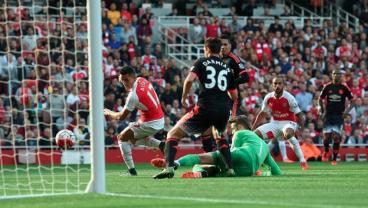You’re one of the lucky few season-ticket holders who managed to score a limited number of tickets to the biggest match in your club’s history. You’ve got some disposable income, but it’s going to cost you an arm and a leg to travel to the final.
What do you do?
Do you spend a lot of money for a once-in-a-lifetime experience, even if it means you probably won’t get to take a vacation this year and maybe have to put off those house or car repairs? Or do you sell your tickets on a third-party website, setting yourself up to have a nice, long vacation with enough left over to buy a sweet new TV on which to watch the game?
If you’re an American, you’d be free to do the former, selling your Super Bowl or World Series tickets to make bank with a huge upsell.
If you’re a Tottenham or Liverpool fan, doing the latter will get you banned for life.
Tottenham Hotspur announced Tuesday it banned three season-ticket holders indefinitely for listing their Champions League final tickets on secondary ticketing platforms.
The Club has this week issued indefinite bans to three Season Ticket Holders who have listed their @ChampionsLeague Final tickets for sale on a secondary ticketing platform.
We shall look to take the strongest possible action against anyone found to be engaging in such activity.— Tottenham Hotspur (@SpursOfficial) May 21, 2019
Liverpool, meanwhile, is investigating five fans of similar behavior, threatening a lifetime ban from Anfield.
However you feel about the resale of tickets, the experience of American to British sports fans could not be more different when it comes to the secondary ticket market.
Tottenham and Liverpool are in a tough situation. Supplied with just under 17,000 tickets apiece at the 68,000-seat Wanda Metropolitano for the Champions League final on June 1, neither club has been able to placate the immense demand for tickets to the biggest men’s soccer match of the year.
Some silly fan groups have begged sponsors to return their tickets, completely ignoring the fact those sponsors are the ones who pay their players’ salaries. But you understand the frustration of seeing your team reach an historic final only to find out you can’t attend in person.
With so few tickets available, a secondary market was always going to crop up. It only makes sense that with limited supply and huge demand, ticket resale could be massively profitable.
But as of 1994, it is illegal for an unauthorized person to sell tickets to a soccer match in England. There are few real secondary markets for soccer tickets in England, as is commonplace for all ticketed events in the United States, from sporting events to concerts.
Thus, Spurs and Liverpool are tossing out bans for fans who were fortunate enough to get tickets but decided for whatever reason they cannot or do not want to attend.
“Please do not ruin one of the biggest occasions in the club’s history by selling on your ticket and profiteering from fellow Spurs fans,” Tottenham’s website wrote.
As an American, I read that as: Please do not ruin one of the biggest occasions in the club’s history by giving your fellow Spurs fans a chance to see the match.
Now, I’m not a staunch capitalist like many Americans; properly regulating many parts of the economy would greatly improve the lives of 99 percent of Americans. But this is one place where I think the open market should have a chance to have its say.
Because there are so few tickets available, it’s unfair for some lucky few to be chosen to attend but others not have any chance at a ticket. A secondary market gives everyone a more equal opportunity to attend the match.
Then there’s the cost of actually attending the game, which we reported could be more than $5,000. Season-ticket holders might have no problem affording the 20 or so home games per season when the matches are right in their backyard, but when the final is across the continent and travel prices are being jacked up, should we be surprised that many fans would rather just stay at home?
If it’s going to be down to chance to get these tickets, why not let the fans cash in instead of forcing them to cash out and spend beyond their means to attend a game they could easily watch from their living room? Spurs has said it would cancel any tickets that are found to have been sold on, which seems extreme — and unfair to anyone who just wants to cheer on Tottenham at the final.
If Tottenham and Liverpool don’t want fans selling on the tickets, then they may as well give away the tickets for free to those fortunate enough to receive them.
Instead, Tottenham is charging admission to watch the Champions League final from the new Tottenham Hotspur Stadium.
Yuck.
It sounds like the clubs are just upset they can’t get involved in the upsell of tickets more so than the opportunity for their fans to make some money off wealthier fans.
Look, I understand the reason behind banning secondary ticket markets. As an American without a huge amount of disposable income, I know better than anyone the insane increase in ticket prices scalping creates.
But there’s got to be some middle ground. If someone is willing to pay $5,000 for a seat at a soccer game, and someone is willing to sell said seat, why stand in their way?
It’s not “profiteering” as Spurs would like you to believe. It’s fair trade.
Anyway, Tottenham and Liverpool should be happy they’re in the damn Champions League final in the beautiful city of Madrid. At least their fans want to go to the final, unlike Chelsea and Arsenal, who can’t even get rid of their 6,000-seat allotment for the Europa League final in Baku, Azerbaijan.

 Home
Home


